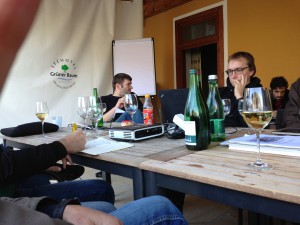Last week I had the pleasure to take part in the Momentum13 symposium. Momentum is a conference series that aims at bridging the gap between the sciences and politics. Initiated by the EU politician Josef Weidenholzer and Barbara Blaha its main purpose is to integrate critical research, leftwing politics and practical experience to think about issues such as “progress”, the motto of this year’s conference. The 3-day event was organized in tracks focussing on various topics including gender equality, social movements, arts & culture, the future of work and politics, and technology & regulation – the track I moderated together with fukami; partly on a huge terrace by the lake with a decent glass of wine.. thanks for that! 
 In our track we had heated debates on small technical details such as internet ports and exploit regulations and big societal questions relating to privacy, democracy and the future of the internet. But these two aspects, of course, closely relate to one another. Seemingly small technical decisions on the legitimacy or illegitimacy of a particular piece of code have largescale political consequences in terms of IT security and the stability of infrastructure we’re using day by day. And vice versa, broad societal developments and power relations influence the construction of information technology and the way the internet looks today. In a capitalist age for-profit companies like Google, for example, figure as central driving force in terms of technology development. The integration of more and more services in the web browser, for example, results in a black-boxing of technology. The less you understand your tools, the more dependent you are on their creators. Or, as fukami put it: “If you can’t break it, you don’t own it”.
In our track we had heated debates on small technical details such as internet ports and exploit regulations and big societal questions relating to privacy, democracy and the future of the internet. But these two aspects, of course, closely relate to one another. Seemingly small technical decisions on the legitimacy or illegitimacy of a particular piece of code have largescale political consequences in terms of IT security and the stability of infrastructure we’re using day by day. And vice versa, broad societal developments and power relations influence the construction of information technology and the way the internet looks today. In a capitalist age for-profit companies like Google, for example, figure as central driving force in terms of technology development. The integration of more and more services in the web browser, for example, results in a black-boxing of technology. The less you understand your tools, the more dependent you are on their creators. Or, as fukami put it: “If you can’t break it, you don’t own it”.
This, however, causes a couple of questions: Do we all need to learn programming to use the computer? (or how else would we be able to “break it”?) Or isn’t it the role of politics and law to set limits where limits are needed (e.g. data protection and the exploitation of user data by big US-American companies) and to protect us from harmful technology? Or is that an illusion in post 9/11 societies where extensive surveillance has become a central interest not only of companies, but also of nation states around the globe? And what can we do about all that? How can we regulate Google, Facebook, Twitter and other tech companies that increasingly shape our information universe, social relations, and political discourses, as we’ve seen in our track in presentations on Twitter politics and data journalism? What role can technology funding play in regard to the steering of information technology? How can we make legal practices more transparent or measure – and promote – open data strategies; or “open everything”? What kind of copyright is feasible in times of file-sharing platforms and how can data protection be secured in companies aiming at full-scale observation of employees? How can we manage risks? Those types of questions were discussed in our track. However, those are also the types of questions that future decision-making processes in the field of technology and society will be concerned with. Negotiations of the new EU data protection law, for example, will serve as an interesting test case for future technology development and socio-political agendas. How this negotiation process will end remains to be seen. That both lobbying on parts of internet businesses and the NSA scandal will be crucially influencing the reform process seems to be clear by now. Or, to cite fukami again, “we should thank Snowden” since his leaks have not only shaken up civil society, but EU policymakers too (hopefully!).
Our track discussions were accompanied by good food and great evening events, such as the keynote by Robert Pfaller or the book-reading by Kathrin Passig. Unfortunately, I missed the huge party that took place Saturday night and the Sunday evening matinee. But I’m sure that was fun too! Next year’s conference will be focused on “emancipation”. I highly recommend going there! (and not only because of the scenic location). More information can be found on the Momentum website (including info on the journals Momentum Quarterly and Momentum Policy Paper).

